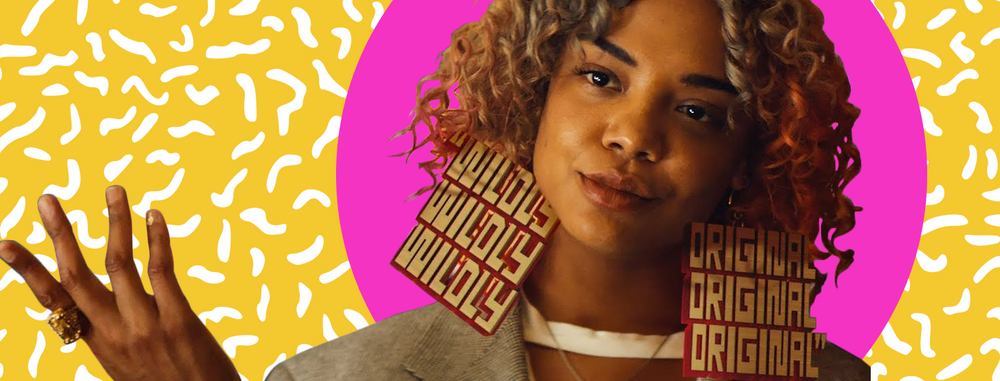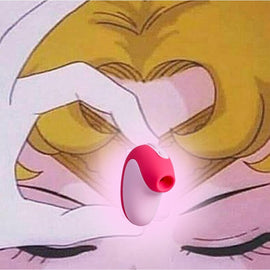The Brilliance of Detroit, Sorry to Bother You's True Hero

I went to check out Sorry to Bother You with a friend this week and let me tell you; it was quite a ride. I won’t spill all of the tea, but basically, it’s about a Black guy named Cassius Green (played by a tattoo-free Lakeith Stanfield) and his misadventures as he navigates through a dark, capitalistic society. Early into his career as a telemarketer, Cassius is encouraged to code switch and he adapts a white voice to help him find more financial success. Though Boots Riley’s satircal film is exaggerated in a few of its depictions, it’s not too far off from our everyday reality. Improper media focus, workhorses, choosing between friends and money, and of course, telemarketing, are just a few of the topics touched on in the nearly two-hour-long film.
One of the main characters (and highlights of the movie) is Detroit, Tessa Thompson’s take on a California-based visual/performance artist. Throughout Sorry to Bother You, Detroit remains a voice of reason and maintains her conviction, while encouraging others to do the same. She shows that you can be wholly original and dedicated to creative expression while fighting for the greater good.
The most surface thing to speak on regarding Detroit is her sense of fashion. I say surface because all you have to do is look at her to form an opinion. But, her style is full of detail–from her statement earrings to her shirt that says “THE FUTURE IS FEMALE EJACULATION,” Detroit continuously makes her stances known through clothes, hair, makeup, and accessories.

Detroit is an artist, meaning that she’s a part of a culture known for its eccentricities (also known as weirdness if you’re broke), as well as its affinity for politics. Many artists, such as Emory Douglas and Frida Kahlo, dedicated themselves to activism, whether it was a part of their work, or just ingrained in their being. In this instance, Detroit’s use of fashion as a form of resistance is brilliant because it’s bound to get people talking. She may not have had time to verbally spread her message to every person she met, but she could make sure that people knew what she was about by peeping her. She IS art. The utilization of her body as a walking message is empowering, especially since it shows that she’s taking control of her form.
When Cassius tasted the sweet honey of financial stability and heightened self-esteem, he started losing his shit. He separated himself from those closest to him, uncontrollably used his white voice, and chose a come up over everything that he once valued. His partner, Detroit, was in the same position as him. She too lived in a crappy apartment (if that’s what you want to call it) and snagged the same job as Cassius. Therefore, she had an opportunity to rise through the ranks and make more bread.
Do you know which side my good sis Detroit chose? The just one. She kept her same homies, and clung to her ethics, no matter what her man did. That required bravery. Not only did she protest Cassius’ switch up, she left him over it. It wasn’t a long, dramatic scene with a cut to her sobbing in the shower. It was a real moment that Detroit had authority over. I appreciate a beacon of morals and emotional stability.

We’ve seen it before. The “brilliant” male artist is trying to come up with his next grand idea. He comes across a woman who gives him life, whether it be through her ideas, pussy, previous works (or all three) and he milks the relationship for all it’s worth. He calls her his “muse.” His breathing mood board that he probably won’t credit because, why should he?
Detroit also wasn’t the background to any man’s foreground. She ran the show. She had her own artistic path, was tagging capitalistic wheat pastings, and had a solo gallery show. It was nice to see a female artist who didn’t depend on a man to help execute or approve her vision. If anything, she realized Cassius was a threat to her ethics and she distanced herself to protect that vision.
Detroit was the true hero of the film because she didn’t take any bull, she followed her heart, and she expressed herself. As the sole woman in a lead role in a socially aware production, she could’ve easily been an annoying caricature of what people think feminism is. Instead, she has full autonomy, and the role is excellently fulfilled throughout the movie. Kudos, Tessa Thompson. I’m stanning.
Brooklyn White is a journalist with content published on HelloGiggles, Teen Vogue, Bitch Media, and more.

Latest Articles

A Hot and Quick Guide to BV, UTIs, and Yeast Infections

9 Acts of Queer Resistance to Know in Addition to the Stonewall Riots








